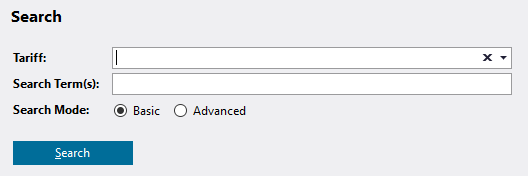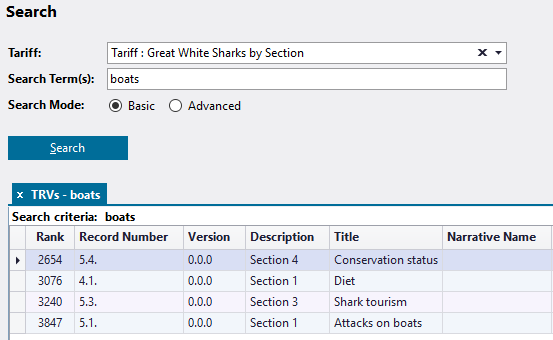TariffShark Tiger User Guide
Not your version? Search
Search
The Search form is used to search Filings, Tariff Record Versions, and Tariff Content within a Tariff Database on the application server to which the user is connected.
The fields that are searched are:
Filing
Tariff Record Version
- Description
- Title
- Narrative Name
- Record Number
- Comments
Tariff Content
- Plain text version of Tariff Record Version content
 Figure 1: Search form
Figure 1: Search form
 Figure 2: Filing search results
Figure 2: Filing search results
 Figure 3: Tariff Record Version search results
Figure 3: Tariff Record Version search results
Fields
| Field | Details | Required |
|---|---|---|
| Tariff | Select the Tariff in which you wish to search. If you do not select a Tariff, only Filings will be searched. | |
| Search Term(s) | Search term(s) for which you wish to search | Yes |
| Search Mode | Select Basic or Advanced | Yes |
FILINGS GRID
| Field | Details |
|---|---|
| Rank | An arbitrary score assigned by the search algorithm. A higher rank indicates a better match to the search criteria than a lower rank. |
| Filing Title | Title of the Filing |
| Status | Status of the Filing |
| FERC Filing Date | Date the Filing will be/was filed with FERC |
| Docket Number | Docket Number of the Filing |
| Filing Type | Type of Filing in the form of (1) the Code, followed by (2) the Description, followed by (3) the Type (in curly braces) |
| FERC Filing Id | This is the Filing identifier that is sent to FERC when the Filing is filed. |
TRVS GRID
| Field | Details |
|---|---|
| Rank | An arbitrary score assigned by the search algorithm. A higher rank indicates a better match to the search criteria than a lower rank. |
| Record Number | Record Number of the Tariff Record Version |
| Version | Version number of the Tariff Record Version |
| Description | Description of the Tariff Record Version |
| Title | Title of the Tariff Record Version |
| Narrative Name | Narrative Name of the Tariff Record Version |
| Option | Option letter of the Tariff Record Version. |
| Filing | The display name of the Filing in which the Tariff Record Version resides. |
| Effective Date | Effective Date of the Tariff Record Version within the Filing. |
| Response | FERC's response to the filing of the Tariff Record Version. If the Tariff Record Version is included in more than one Filing, the field will display "multiple". |
| Comments | Displays an icon for Tariff Record Versions that have comments. Hover the mouse over the icon to read the comments. |
| Change Type | The type of change that was requested for the Tariff Record Version. If the Tariff Record Version is included in more than one Filing, the field will display "multiple". |
| File As | The type of document (RTF or PDF) that will be filed as the Tariff Record Version's content. If the Tariff Record Version is included in more than one filing, the field will display "multiple". |
Basic Search
A basic search consists of any text, including words, phrases, or sentences. TariffShark will list Filings and TRVs found to contains the search term(s).
Terms or phrases enclosed in double quotes are taken literally and no inflectional forms are generated. For instance, searching for "tariff shark" (including the quotes) will match only results with the exact phrase "tariff shark" whereas without the quotes any combination of the two words and their inflectional forms (e.g. tariffs, sharks) will be returned followed by matches of each word individually.
Noise Words/Stopwords
These are common tokens that are considered useless or nearly useless in search applications and thus eliminated from the search. These include tokens that are either too short (e.g., "a", "I", "1") or tokens that occur too frequently to add value to a search (e.g. "the", "is", "this").
Example
- this is the tariff
Advanced Search
Boolean Logic
The keywords "AND", "AND NOT", or "OR" can be used to apply Boolean logic to search terms
Example
- tariff AND NOT shark
Prefix Searches
The wild-card asterisk symbol "*" can be used to perform a prefix search. Results are produced based upon any words within containing the specified prefix. The search token must be enclosed in double quotes for the server to recognize it as a prefix search term.
Example
- "tar*"
Proximity Searches
Using the keyword "NEAR" (or the "~" operator) between two search terms performs a proximity search in which the number of intervening words between terms is factored into the rank of results that contain both terms.
Examples
- tariff NEAR shark
- tariff ~ shark
Inflectional Searches
Different forms of a word can be searched for by using the "FORMSOF(INFLECTIONAL, search_term)" function. Language-specific rules and dictionary lookups are used to generate inflectional word forms which include verb conjugations, plural and singular nouns, and adjective forms. For instance, specifying the search term "swim" will result in a search being performed for each of the following "swim", "swims", "swimming", "swam", and "swum".
Example
- FORMSOF(INFLECTIONAL, sharks)
Weighted Searches
The ability to associate higher preference for certain search terms over others can be achieved by using the ISABOUT function with the WEIGHT keyword. The higher the weight of the term (between 0.0 and 1.0) the greater preference the match will be given.
Example
- ISABOUT(tariff WEIGHT(0.2), shark WEIGHT(0.8))
Action Buttons
| Button | Details |
|---|---|
| Search | Initiates the Search |